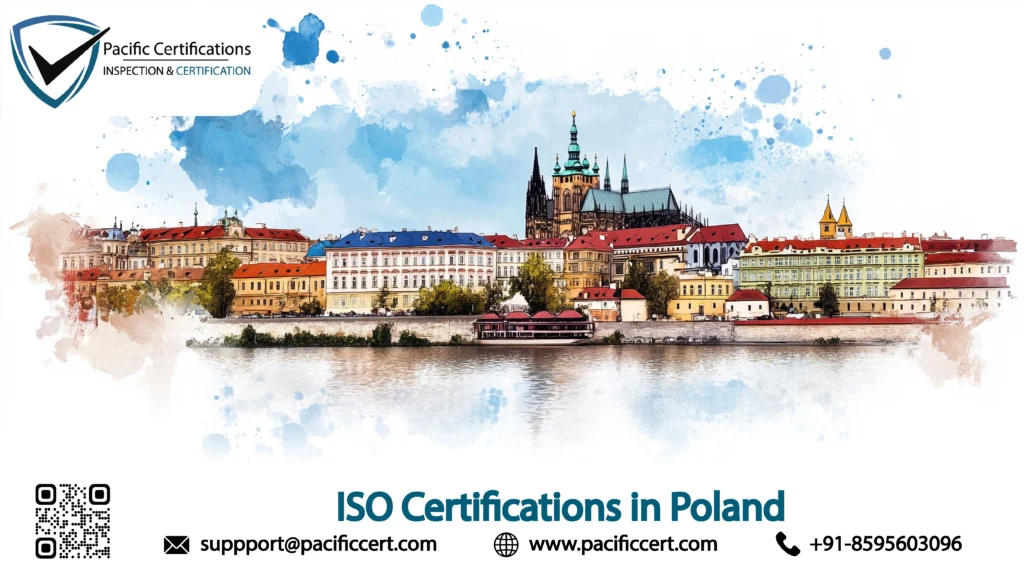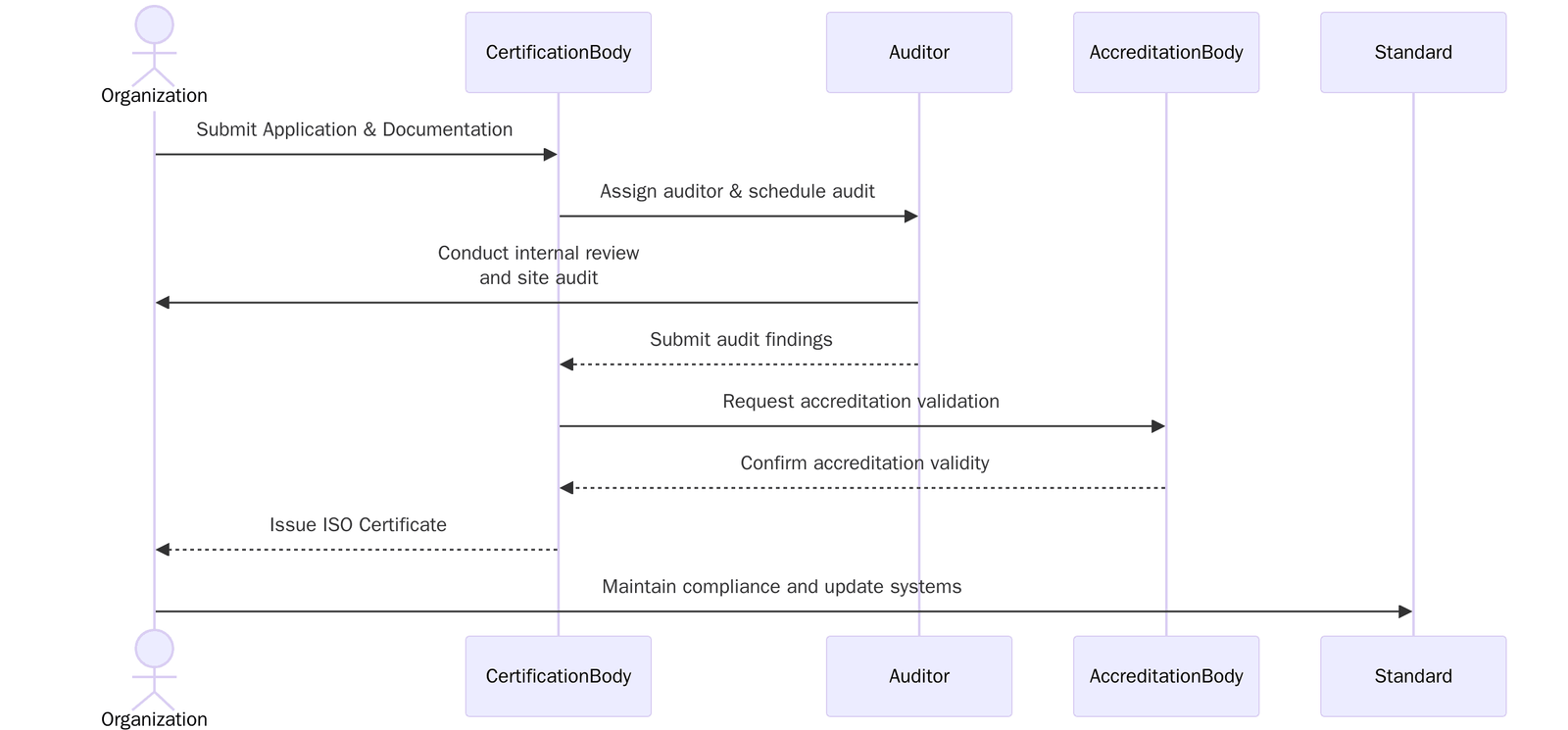
Introduction
Poland’s economy blends Baltic-facing logistics and ports, automotive and components, machinery and electronics, construction and cement, agrifood and cold chain, healthcare and labs and a fast-growing digital base across banking, telecom and public platforms. By adopting ISO 9001 (Quality Management), ISO 14001 (Environmental Management) and ISO 45001 (Occupational Health & Safety), Polish companies can steady quality, reduce waste and build confidence with lenders, buyers and regulators. For ports, EPC, food processors and ICT, ISO certification is a practical step to win EU and global work. These programs give auditable proof across quality, safety, environment, energy, security and continuity.
Share your operational scope and sites for Poland with Pacific Certifications and we will align accreditation coverage then propose Stage-1 and Stage-2 audit windows that fit your seasonality and logistics.
Economic Context & Industry Overview
Poland is scaling energy transition and industrial capacity while strengthening its role as an Atlantic–Baltic logistics hub. Government and EU materials confirm updated NECP 2030 work and targets under the Fit for 55 packages. Offshore wind is moving from FIDs to build, with targets near 5.9 GW by 2030 and up to 18 GW by 2040 discussed in sector reports. Ports continue to post growth, with Gdańsk recording strong 2024–2025 throughput and over 2.24 m TEU in 2024. Automotive output has been rebounding, including trucks and vans alongside EV and hybrid drivetrains.
Why ISO certifications matter in Poland?
Buyers, lenders and public bodies want evidence-based systems with traceable records. Teams can move through vendor reviews much faster with ISO in place, keeping operations steady across sites and lines while reducing incidents and protecting both data and uptime. With ISO 9001, organizations strengthen process control and keep a closer handle on suppliers. Environmental, health and safety practices get a real boost under ISO 14001 and ISO 45001, especially for plants, projects and terminals. For companies with major energy use, ISO 50001 offers a clear way to demonstrate proven improvements in energy performance. ISO/IEC 27001 and ISO 22301 build trust for banks, telecom and public platforms. ISO 22000 give HACCP-based assurance for agrifood and cold chain serving export routes.
Popular ISO Standards in Poland
| Industry focus | Commonly requested standards | Why they matter |
| Ports, terminals, 3PL, free-zones | ISO 9001, ISO 14001, ISO 45001, ISO 28000, ISO 22301 | Turnaround discipline, site EHS, chain security, continuity |
| Automotive, machinery, EPC | ISO 9001, ISO 14001, ISO 45001 | Process stability, emissions and waste control, safer works |
| Agrifood, fisheries, cold chain | ISO 22000 ISO 9001 | HACCP, temperature integrity, traceability |
| Banks, telecom, cloud, public platforms | ISO/IEC 27001, ISO 22301, ISO/IEC 20000-1, ISO/IEC 27701 | Security, continuity, IT-service quality, privacy |
| Power and large users | ISO 50001 with ISO 14001/45001 | Energy performance with auditable EHS |
| Healthcare, labs and diagnostics | ISO 9001, ISO 15189, ISO/IEC 17025 | Patient trust, valid methods, competence |
Certification Process in Poland
Preparation starts with an honest view of how work runs today and how evidence is captured. The aim is to make your system auditable without reinventing daily routines. Below are the steps to consider:
• List products services sites headcount and high-risk processes for clear scope
• Map processes end to end to show handoffs records and responsibilities
• Set policy and measurable objectives linked to customer and legal needs
• Assemble evidence packs for operations maintenance labs IT and logistics
• Train process owners and keep competence matrices current
• Calibrate instruments verify methods and file certificates for quick checks
• Run internal audits that sample high-risk tasks and supplier interfaces
• Hold management review with KPIs audit results complaints legal updates and actions
• Schedule Stage-1 for readiness and Stage-2 for implementation verification align multi-site sampling to risk
• Blend on-site checks with remote interviews where suitable to reduce travel time
• Keep permits licences and regulatory reports organised for quick verification
What are the requirements of ISO Certifications in Poland?
Make the system mirror real work on terminals and yards, plants and projects, clinics, warehouses and data rooms so records hold up in audits, inspections and buyer reviews; below are the key requirements:

- Scope matched to products or services, processes and sites including multi-site programs
- Controlled documents and records that reflect practice not theory
- Risk assessment with operational controls for actual hazards, HACCP, site safety, environmental aspects, privacy or security, energy and change management
- Competence matrices and training records for process owners and high-risk roles
- Internal audits with reports nonconformities root-cause actions and verified closures
- Management review with inputs, KPIs, audits, incidents or complaints, legal updates and tracked decisions
- Standard-specific artefacts: HACCP and CCP logs (ISO 22000), Statement of Applicability and risk files (ISO/IEC 27001), HIRA and PTW (ISO 45001), aspect-impact registers and objectives (ISO 14001), energy review and EPIs (ISO 50001)
- Legal and other requirements register with permits inspections calibrations monitoring data and supplier compliance proofs
Tip: Map controls to GDPR with Law 58/2019-style national execution equivalents under UODO guidance, maritime and port safety, veterinary and food hygiene and energy-environment permitting.
What are the benefits of ISO Certifications in Poland?
Use certification to move faster through tenders and vendor onboarding, reassure lenders and partners and keep work steady across sites and seasons; below are the key benefits:
- Faster prequalification in buyer portals and public procurement
- Fewer incident defects and stoppages on sites lines and yards
- Clear roles and skill paths for operations and maintenance teams
- Traceable data for warranty claims ESG and due diligence
- Stronger supplier control through audits KPIs and corrective actions
- Measured gains in energy use waste emissions uptime and yield
- Stronger brand signals across EU corridors and global routes
Market Trends
Final investment decisions in 2025 and project pipelines point to first Baltic turbines generating from 2027–2028, supporting the national 5.9 GW by 2030 trajectory and multi-GW growth by 2040. Liberalised onshore rules and distance changes are designed to unlock additional capacity. Expect utilities, EPCs and large users to expand ISO 50001 and ISO 14001/45001 with ISO 22301 for continuity on grid projects. (source: Reuters)
Port growth and corridor logistics. Port of Gdańsk reported record containers in 2024 and strong 2025 momentum, reinforcing adoption of ISO 9001/14001/45001/28000 and continuity frameworks among terminals, 3PLs and free-zones.
Cybersecurity regulation. NIS2 implementation is expanding the number of obligated entities with stricter sanctions and executive accountability. This will continue to drive demand for ISO/IEC 27001, ISO 22301 and ISO/IEC 20000-1 across banks, telecom, cloud and public platforms. (source: Digital Strategy)
Challenges Faced in Poland
Operational, regulatory and evidence-readiness issues related to getting certified can cause delays, budget and staffing gaps, incomplete or outdated documentation and records, weak internal audits and corrective actions, supplier-control gaps, multi-site sampling and travel logistics, calibration and permit backlogs and data or privacy mapping for ICT; below are the key challenges:
- Budgeting for certification time and system upkeep
- Treating ISO as paperwork in some teams which slows adoption
- Shortage of trained internal auditors outside core hubs
- Stalling on document control internal audits and corrective-action discipline
- Multi-site and supplier sampling complicating logistics and evidence quality
What is the cost of certification in Poland?
Budgets are confirmed after scoping and reflect headcount and risk, the number and spread of sites, your standards set, single or integrated such as 9001+14001+45001, sector sampling depth for terminals plants warehouses clinics or cold chains and any field logistics. Your proposal itemises Stage-1 Stage-2 and surveillance days, clarifies on-site versus remote activities and highlights any multi-site efficiencies for predictability.
For personalized quote, contact support@pacificcert.com.
What is the timeline for certification in Poland?
Timelines depend on document and record readiness, the speed of closing Stage-1 findings, single- versus multi-site scope and whether the program is single-standard or integrated. Planning around port windows shutdowns project ramps or peak seasons and auditor travel to regional sites also affects duration. A prepared single site can move from application to decision within one audit cycle. Multi-site or integrated programs need additional sampling and planning time.
Important standards often requested by buyers in Poland
| Standard | Typical drivers in Poland |
| ISO 9001 | Prequalification for EPC vendors, terminals and public contracts |
| ISO 14001 + ISO 45001 | Construction and site EHS controls, lender conditions |
| ISO 22000 or FSSC 22000 | HACCP and traceability for agrifood and cold chain |
| ISO/IEC 27001 + ISO 22301 | Security and continuity for banks, telecom and public platforms |
| ISO 28000 | Chain security for ports, 3PL and free-zones |
| ISO 50001 | Energy performance for utilities and energy-intensive users |
How Pacific Certifications can help?
Pacific Certifications audits and certifies ISO management systems for ports and 3PL, automotive and EPC, agrifood and cold chain, healthcare and labs and ICT or cloud across Poland. We work under recognized accreditation with transparent pricing and an experienced local team that understands site realities and buyer expectations. Our certificates are accepted by procurement portals and international customers and we are recognized by ABIS.
Request your ISO audit plan and fee estimate. We will help you map Stage 1 and Stage 2 timelines and evidence requirements for your organization. Contact us at support@pacificcert.com or visit www.pacificcert.com.
Accredited Training Programs
Pacific Certifications provides accredited training programs in Poland for ISO 9001, ISO 14001, ISO 45001, ISO 22000 ISO/IEC 27001, ISO 22301 and ISO/IEC 20000-1.
- Lead Auditor Training: for professionals auditing these systems across Polish industries.
- Lead Implementer Training: for personnel establishing or improving systems in terminals plants cold chains hospitals utilities and ICT platforms.
These programs are conducted online or onsite, depending on client needs under ISO/IEC 17024 for personnel certification.
To begin the process or request a quotation, contact us at support@pacificcert.com or visit www.pacificcert.com.
Our team will guide you through the audit and certification process and planning stages specific to your operations in Poland.
FAQs
How long does certification take in Poland?
A prepared single site can complete in one audit cycle from application to decision. Multi-site or integrated programs take longer due to sampling and scheduling.
What factors determine audit time?
Headcount, risk, number of sites, chosen standards and logistics. We provide a documented proposal after scoping.
Can audits be partly remote?
Yes, records reviews and interviews can be remote with targeted on-site sampling for high-risk processes and facilities.
Which standards suit ports and logistics?
ISO 9001 + ISO 14001 + ISO 45001 + ISO 28000, with ISO 22301 for continuity.
What fits agrifood and cold chain?
ISO 22000 for HACCP and traceability with ISO 9001 for process stability.
How do banks and telecom platforms benefit?
ISO/IEC 27001 builds trust in security. ISO 22301 supports uptime commitments. ISO/IEC 20000-1 strengthens service quality.
Do you certify SMEs and NGOs?
Yes, we right-size audit time and sampling for small teams and distributed sites.
What should we prepare before Stage-1?
Scope, process map, risk and opportunity records, policy and objectives, competence records, controlled procedures, internal audit and management review.
Will international buyers accept our certificate?
Our accredited certificates are recognized by buyers and portals across the EU and worldwide.
How do we maintain certification?
Run internal audits on schedule, close NCRs, hold management reviews, monitor KPIs, complete Year-1 and Year-2 surveillance and recertify in Year 3.
Ready to get ISO certified?
Contact Pacific Certifications to begin your certification journey today!
Suggested Certifications –
Read more: Pacific Blogs






